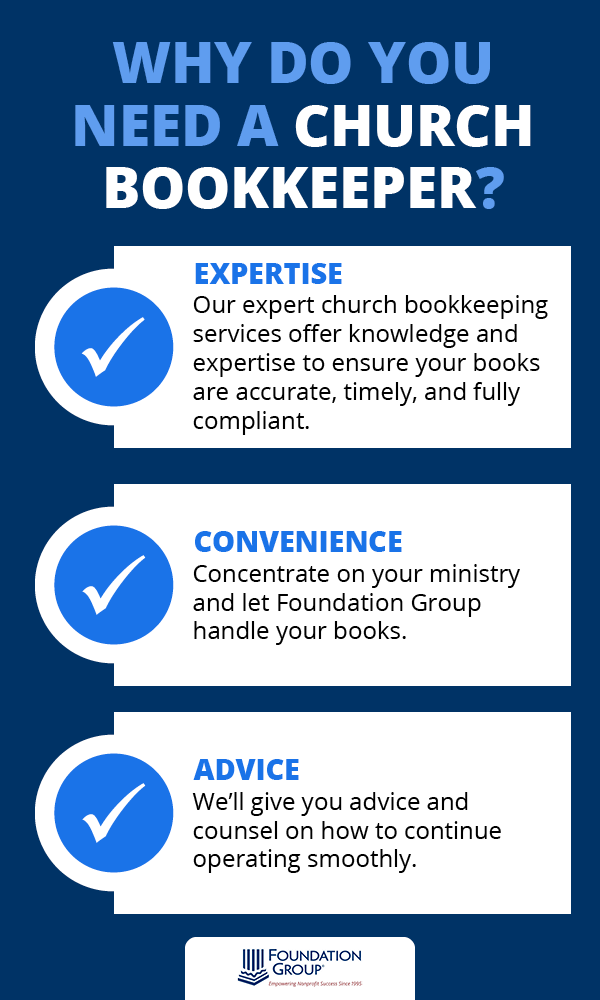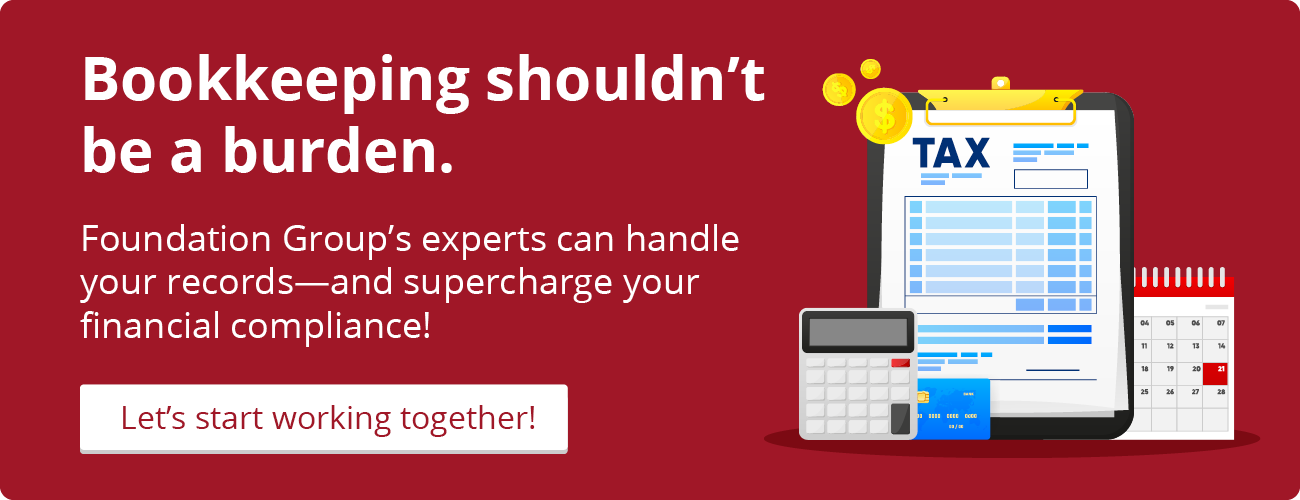Bookkeeping for Churches: How to Balance Faith and Finances

While your church’s main focus is its ministry, orderly finances are necessary for any organization to operate effectively. The best way to set your church up for success is by wisely allocating your resources, communicating financial transparency, and meeting legal compliance requirements, all of which can be accomplished with effective bookkeeping.
We’ll cover everything you need to know about bookkeeping for churches, including benefits, best practices, and tips for outsourcing. Whether you’re new to bookkeeping or want to upgrade your church’s financial management approach, we’ll equip you with the knowledge you need to be successful. Let’s start with the basics of church bookkeeping.
What is Bookkeeping For Churches?
Like other 501(c)(3) nonprofits, churches must use their revenue wisely to fund their missions while also complying with legal requirements. To do this, churches must keep thorough and accurate records as they collect revenue from various sources. That’s where bookkeeping comes into play.
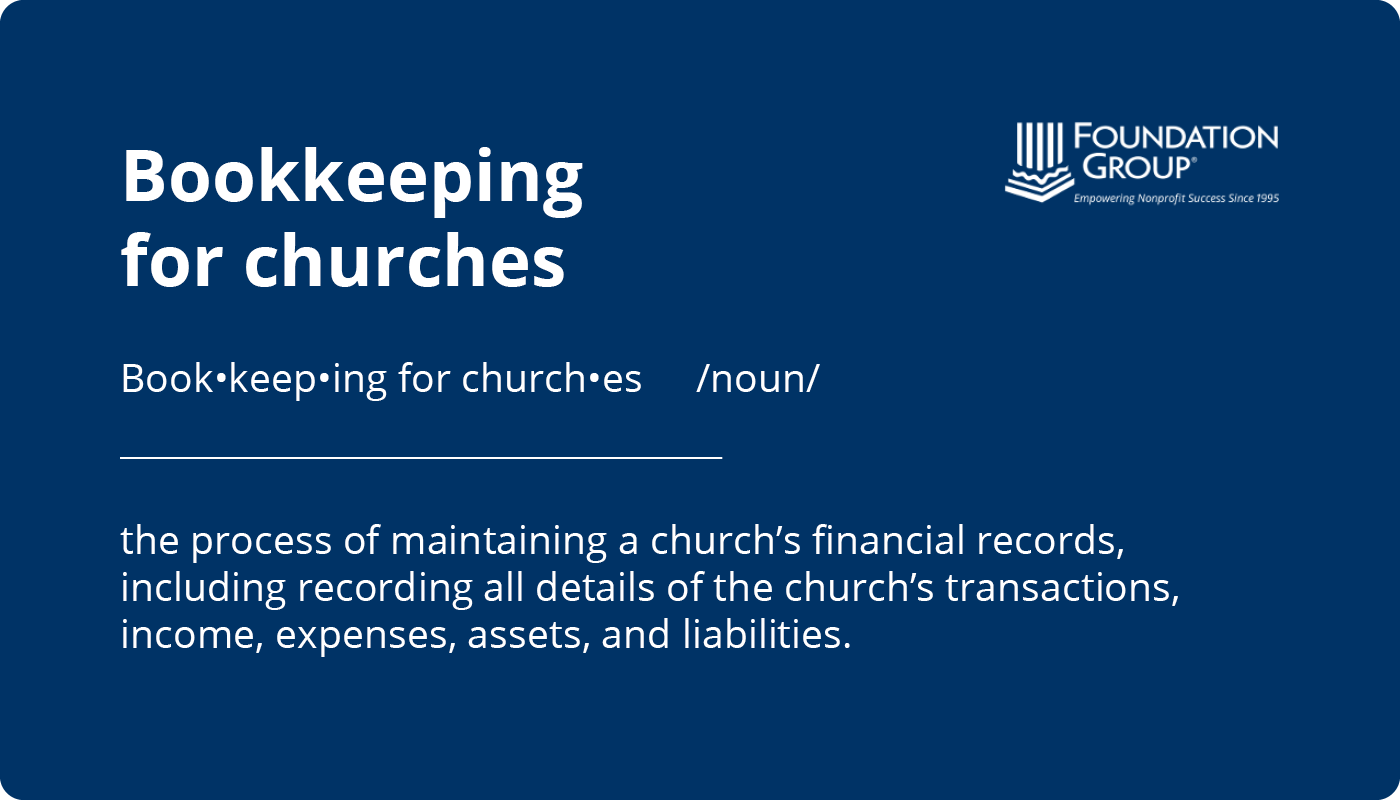
Bookkeeping for churches is the process of maintaining a church’s financial records. This process includes recording all details of the church’s:
- Transactions: A transaction of funds involves each instance of your church spending or receiving money. A specific transaction may include one or more of the categories below.
- Income: For churches, income can include offerings or tithes, investments, grants, fundraiser donations, pledges, and more. Since this income depends on members of a church’s congregation, it can be difficult to predict, and some donations may come with specific restrictions.
- Expenses: Whatever it costs to keep the doors of your church open is considered your expenses. This might include the cost of utilities for your building or the advertising expenses associated with promoting your church online.
- Assets: Let’s say your church owns three vans for transportation to community service events. While the church doesn’t actively receive income from these vehicles, they’re considered assets if you fully own them. Assets cover everything your church owns, from vehicles to property to the sound equipment in your sanctuary.
- Liabilities: This includes anything owed by your church, such as a loan or mortgage. These debts can be short-term obligations or long-term liabilities.
As you can see, a wide variety of resources can impact your church’s finances. That’s why everything your church owns and spends, whether monetary or nonmonetary, must be thoroughly recorded. While each church’s books are unique to its resources, any church can get started with bookkeeping using the following steps.
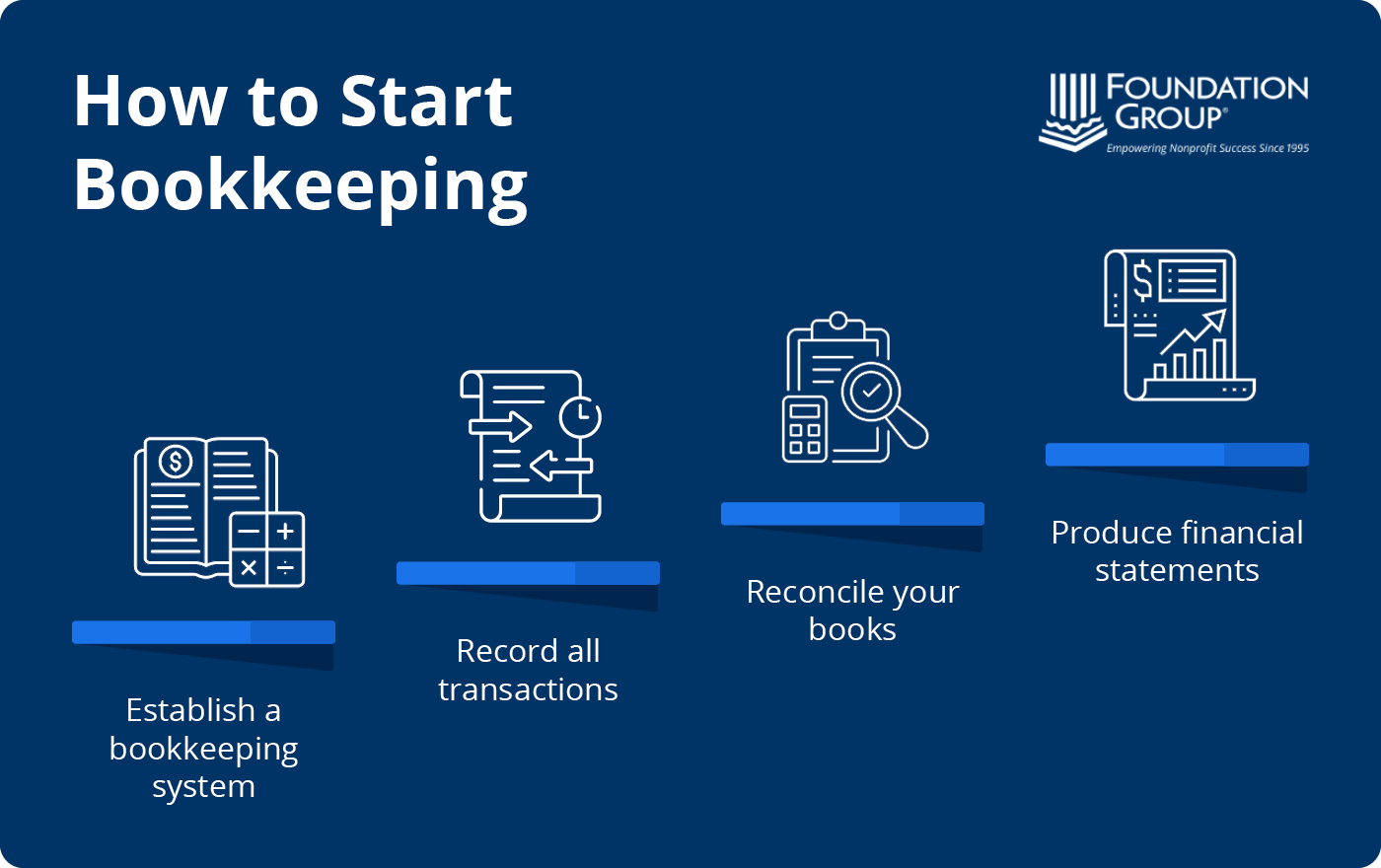
- Establish a bookkeeping system. Determine the logistics of how your church will handle bookkeeping. For example, will you record financial data using a digital tool or a physical ledger? Who will be responsible for bookkeeping?
- Record all transactions. As financial transactions take place, your designated church bookkeeper should record them in thorough detail. That way, you can avoid having to go back and add records after the fact.
- Reconcile your books. Compare donor activity to your financial records on a monthly basis to look for any errors or mistakes. If you come across any inaccuracies, address them as quickly as possible to keep your books up-to-date.
- Produce financial statements. Summarize your financial information in a report detailing your revenue, expenses, and net asset change. To comply with the IRS’s accounting standards for churches, you must produce a Statement of Financial Position, Statement of Activities, Statement of Cash Flow, and Statement of Functional Expenses.
Standardizing the bookkeeping process for your church can ensure that nothing is forgotten. We’ll go into further detail about delegating the bookkeeping task later, but it’s worth noting that you should include the four steps listed above in your established bookkeeping process.
What Are The Benefits of Bookkeeping For Churches?
Aside from simply helping you manage your church’s money more wisely, effective bookkeeping for churches offers a wide range of benefits. When done correctly, the process allows you to:
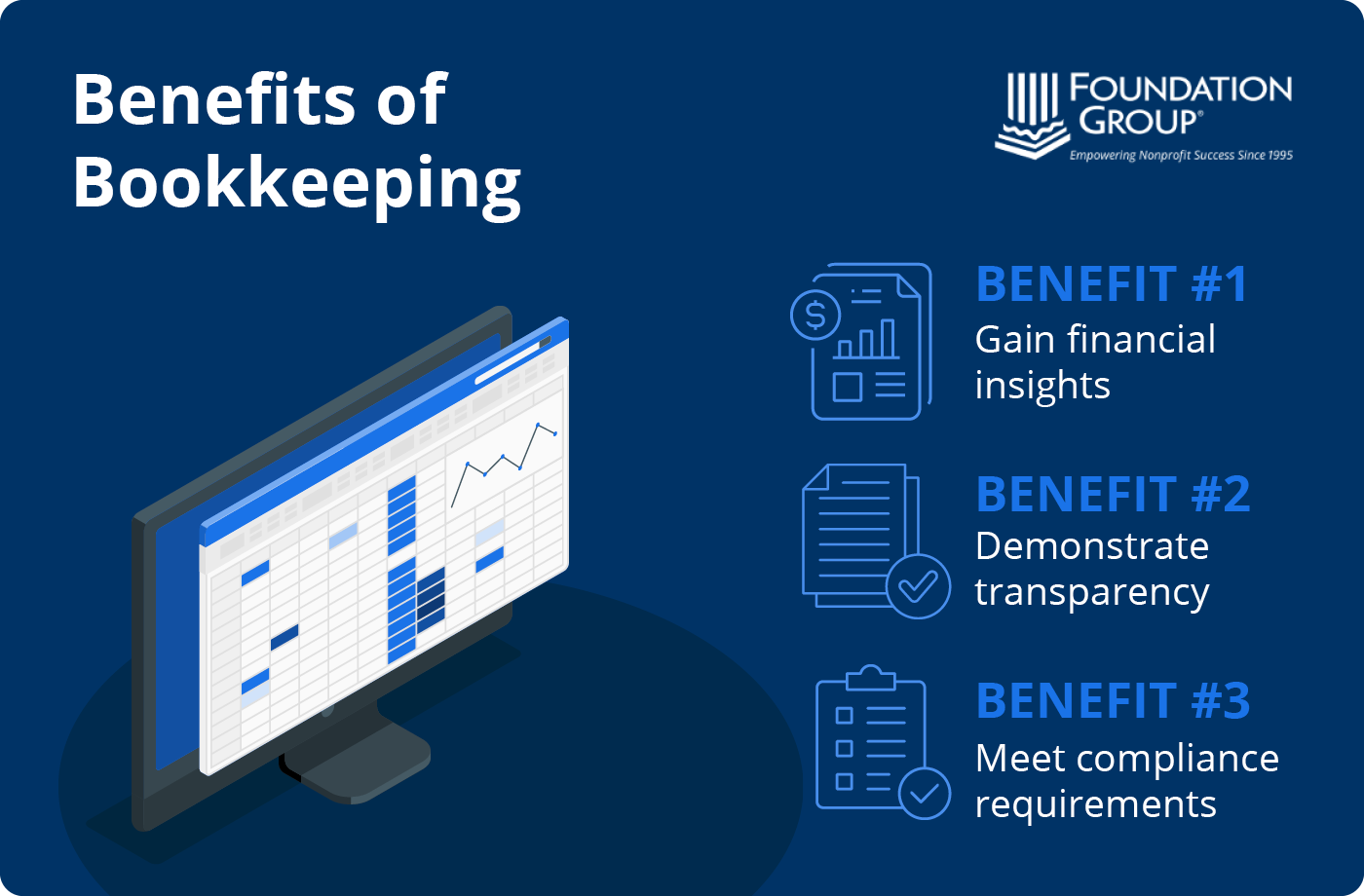
- Gain financial insights: Bookkeeping for churches provides an overview of the church’s financial position, allowing you to make important decisions. For example, orderly and accurate books can guide your budgeting decisions and help you determine the best way to allocate your resources.
- Demonstrate transparency: Members of your congregation give willingly and likely with the hope that you’ll use their contributions wisely. Instead of asking them to give blindly, effective bookkeeping provides a clear view of the church’s finances and gives members the confidence that you’re using the church’s funding for good.
- Meet compliance requirements: While churches may not have annual filings, such as Form 990, that doesn’t mean they won’t encounter the IRS at all. In fact, obtaining 501(c)(3) status for your church grants you proof of satisfying the necessary requirements and allows congregants to make tax-deductible contributions to your church.
Additionally, church bookkeeping can help you avoid operational mistakes, such as accidentally misappropriating funds. But you must record financial data thoroughly and accurately to reap these benefits.
Church Bookkeeping Best Practices
To make the most of your church’s financial data, you’ll need to approach bookkeeping with care. Consider the following best practices to make your bookkeeping a breeze.
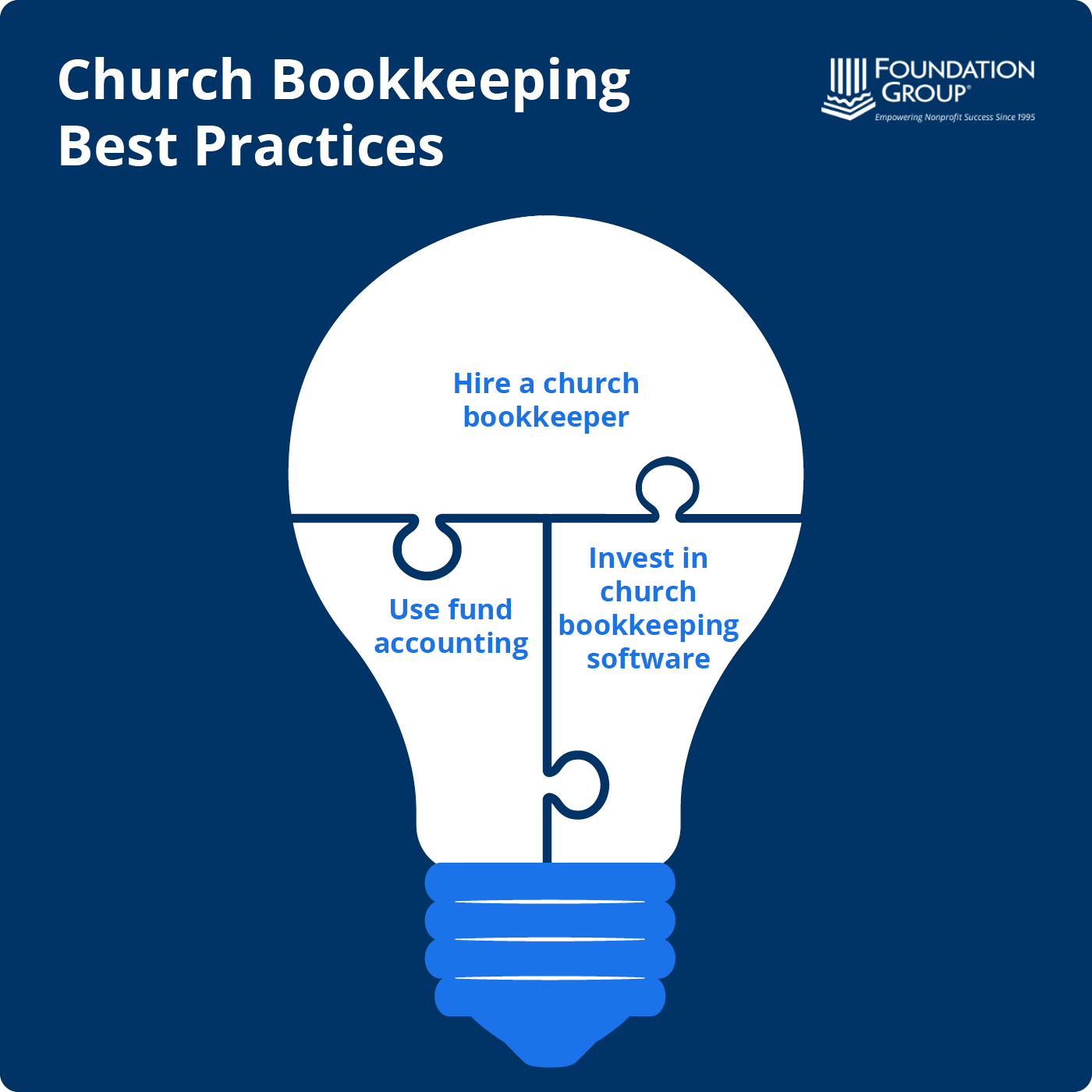
Hire a church bookkeeper
Most church leaders are concerned with ministry, not financial management. This means you’ll need to find time and gain the expertise necessary to keep accurate and compliant books. Instead of adding this extra responsibility to your plate, reach out to a professional church bookkeeper.
A church bookkeeper can help you manage everything from simple budgeting to complex compliance concerns. This process entails knowing the ins and outs of bookkeeping and getting to know your church to better understand how you uniquely handle your finances.
Use fund accounting
Fund accounting is a system by which an organization tracks its resource allocation by separating funds into different categories. For example, your church may use a $100 tithe to contribute to your operational costs or a specific program, like your children’s ministry. This method helps to ensure that you use resources wisely and productively across the organization’s operations.
Churches can generally separate funds into three categories:
- General: This fund covers the expenses that allow your church to continue operating, such as the cost of utilities or supplies for a Bible study group.
- Missions: Any philanthropic good your church engages in, such as mission trips or community service, can be funded by these resources.
- Building: The cost of your church’s physical location, including landscaping, pest control, and other expenses, may be covered by this fund.
Fund accounting also helps churches keep an eye on restricted funds since all resources are categorized and allocated accordingly. Let’s say the $100 tithe from the example above was given by a congregant who wanted their contribution to be used for your children’s ministry program. Fund accounting prompts you to make this distinction as soon as you receive the gift.
Invest in church bookkeeping software
Especially when using the fund accounting method to organize your finances, your church’s bookkeeping is likely too complex to simply input data into a spreadsheet. Dedicated accounting software can streamline bookkeeping and might even offer budgeting tools to help you plan for the future based on your bookkeeping insights.
How to Hire a Church Bookkeeper
It’s no mystery that you can simplify church bookkeeping by outsourcing the task to a professional. If you’re interested in taking this route, use the following tips to find the right expert:
- Consider experience. When researching your options, consider the background of the bookkeepers you reach out to. Do they have experience in bookkeeping for churches similar to yours? Are they certified in specific software?
- Check reviews. Learn about a bookkeeper’s reputation by checking reviews online and among the professional’s client base. You can also ask other church leaders in your area if they’ve worked with a church bookkeeper and what their experience was like.
- Get a consultation. Prepare questions for the bookkeepers you meet with that push them to be transparent about their experience and qualifications.
Working with Foundation Group’s experts allows your church to unlock the expertise needed to manage your books and the convenience of delegating the task to someone else. Plus, you’ll receive advice and counsel on how to continue operating smoothly.
Final Thoughts on Bookkeeping for Churches
Church bookkeeping should be a top priority for every congregation, especially considering the implications effective bookkeeping has on your church’s financial management and legal compliance. To ensure your books are accurate and compliant, outsource the task to a professional who can navigate the complexities of your finances.
If you’re interested in more resources about maintaining your church’s legal compliance, check out the following articles:
- Does a Church Need 501(c)(3) Status? A Guide to IRS Rules. You know that your church is a nonprofit, but does it need 501(c)(3) recognition from the IRS? Find the answer in this guide!
- How to Start a 501(c)(3) Nonprofit. Whether you’re starting a new church or another charitable initiative, read this guide to learn the ins and outs of nonprofit startups!
- How to Handle a Revoked 501(c)(3) Status in 4 Steps. Failing to maintain compliance with the IRS is scary but not unfixable! Check out our guide to handling a revoked 501(c)(3) status for everything you need to know.
who subscribe to our free, email newsletter. It’s information that will empower your nonprofit!


